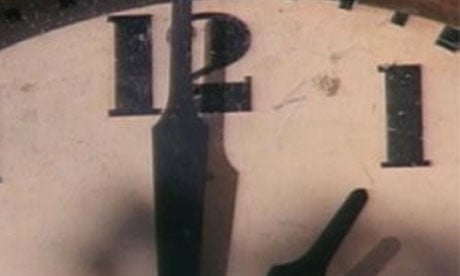This week, very late to the party, I visited Christian Marclay's staggering moving-image installation The Clock, a 24-hour montage of thousands of film and television clips with glimpses of clocks, watches, and snatches of people saying what time it is. This incredible installation is set up so that whatever time is shown is, in fact, the correct time as of that instant. So as well as providing food for thought about the nature of time in the cinema, and indeed in life itself, the whole thing itself functions as a gigantic and gloriously impractical clock. By the time you read this, it may be possible to get The Clock as a streaming-video app to download to your iPhone, automatically putting itself in sync with your time setting.
The Clock is now showing at the Hayward Gallery in London as part of the British Art Show 7 and is soon moving on to Glasgow and then Plymouth. The London showings finish this weekend, when The Clock has a special late-night opening until 1am. Generally, gallery opening times permit visitors only to experience the "daylight" part of The Clock. The night-time stretch promises a special intensity.
Some time ago, I blogged about a montage compilation which I hailed as the greatest YouTube clip of all time, simply showing 100 tiny film clips, quoting numbers in countdown-sequence from 100 to 1. It is now clear that this piece was simply John the Baptist to the Jesus of Christian Marclay's The Clock. Many commenters on that blog did in fact presciently refer to the work of Christian Marclay. Another critic recommended Godard's Histoire(s) du Cinéma.
I should confess, when I first sat down to The Clock, that I had a sneaking, off-message feeling that the humble YouTube "number" compilation might actually be delivering the same idea with less fuss. But that's not true. You have to settle into The Clock, and go into the extraordinary trance-like state that it induces. When I first arrived, I found myself giving a little amused laugh at each appearance of the time. Then the novelty wore off and I became silent. Some other people, arriving after me, went through the same process. I arrived just after 11 in the morning and left before 1pm, so I went through the midday climax of emotions: I expected, and got, Gary Cooper in High Noon. Then there were a lot of shots of clocks and watches and lunchtime and people wondering if it was time for lunch. There were, generally, a large number of shots of Big Ben and large institutional clocks, lots of scenes of people hurrying for trains, late for trains, early for trains, hanging around on platforms. The Clock might turn out to be one of the great train movies.
Sometimes the time is just glimpsed in the background of a shot, irrelevant to the action and sometimes the time gives a sharp stab or poke to the dialogue: particularly with scenes in which time is running out. The Clock is, unexpectedly, quite a sensual, sexy film, in that the late morning stretch features plenty of shots of people in bed, waking up, embracing and then realising that these are forbidden pleasures – forbidden by the clock. ("What's the time? Is that the time?" etc) The time is an alarm clock, a constant silently pinging alarm clock.
There are droll shots of sundials in period movies. There is an ambiguous moment from Easy Rider in which Peter Fonda looks at his watch (showing 11:40am) and throws it away. It appears to have stopped. (Wait. So is that the time in the film? Has it just stopped that moment?) Marclay even shows the "Alas poor Yorick" scene from Olivier's Hamlet. Where was the time going to be mentioned? Just before the end of the clip, a distant bell tolls the quarter-hour. Later clips show 12:13pm, 12:14pm. So is Shakespeare's clock fast? And is there textual evidence that this is the time?
For me, the weirdest effect of The Clock is that the time references became fictional – I stopped noticing that they were telling me exactly what the time actually was. They became a series of numbers which ordered the mosaic of moods and moments. And then, slowly but surely, I stopped noticing the time entirely. I just drank it in, just accepted the juxtapositions.
The Czech writer Petr Král, in the essay entitled "Time Flies" (collected in Gilbert Adair's excellent 1999 anthology Movies) describes watching with a companion the 1916 silent movie serial Judex by Louis Feuillade. He recalls: "Suddenly on the screen there appears a clock set in the centre of the kind of sumptuous salon that epoch, and Feuillade, alone had a taste for; it shows 4:40pm. One of us automatically consults his watch: 4:40 to the second. For an instant our present, across the ruins of several decades, has rejoined that of an afternoon in the 1910s." The pleasure of making this connection, infinitely repeated, is at first a conscious, then a subconscious or unconscious pleasure in The Clock. (I wonder if Marclay actually uses the 4:40pm moment from Judex – can anyone tell me?)
I walked out of The Clock, on to the bleached-white concrete walkway on the South Bank, and saw the clock on the Shell Building on the other side of the Thames. 12:55pm. "Ha!" I found myself thinking. "Five to one! It's five to one. You can see the time on that clock in this shot." A fraction of a second later, I realised that – ahem – I had been returned to real life, and that the clocks you see around the place will, of course, give you the actual time. Or will they? They are not guaranteed accurate like the ones in Christian Marclay's installation. What a fascinating and pleasurable event it is. It will run and run – without needing to be wound.

Comments (…)
Sign in or create your Guardian account to join the discussion